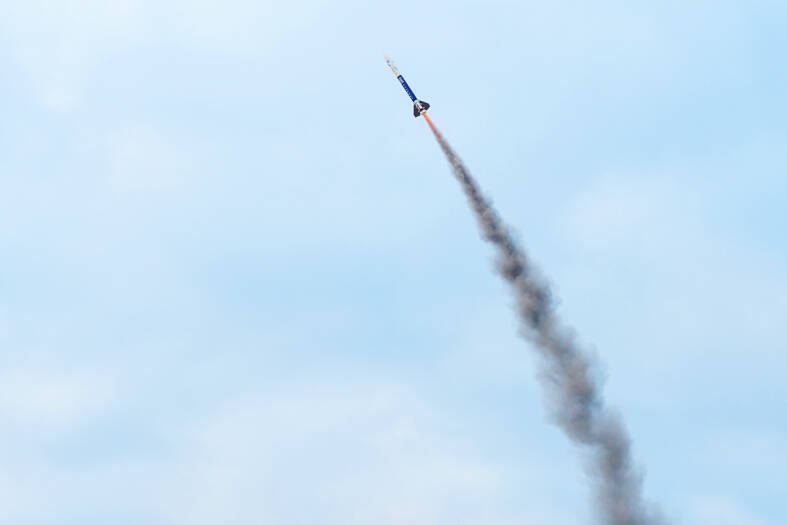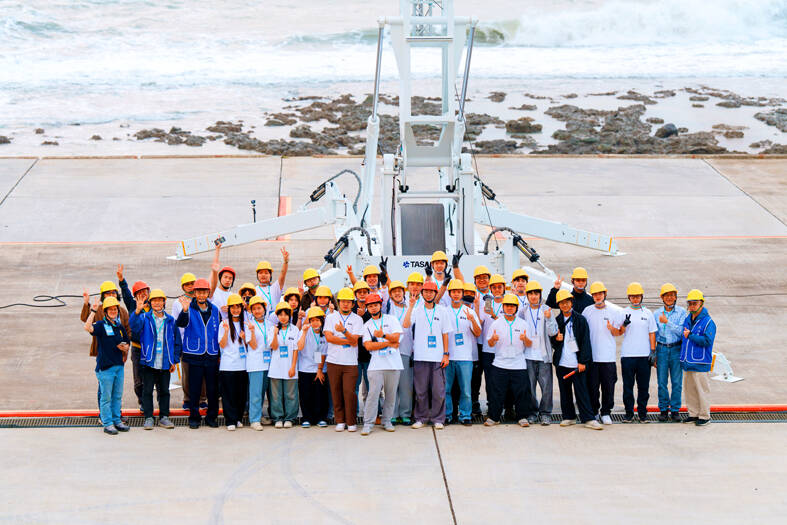The Tamkang II rocket (淡江二型), developed by the Aerospace Technology Laboratory of Tamkang University’s (TKU) Department of Aerospace Engineering, was successfully launched to an altitude of over 7km yesterday, with data transmission functional throughout the flight.
The rocket, launched at 6:46am from Hsu-Hai Research-use Rocket Launching Area in Pingtung County, was the fourth built by the lab. TKU aerospace engineering professor Wang Yi-ren (王怡仁), the project’s principal researcher, said the Tamkang II rocket was launched to test the rocket’s avionics system.
During yesterday’s test flight, active propulsion lasted 13 seconds, with a total ascent time to the apogee of 38 seconds, Wang said.

Photo courtesy of Taiwan Space Agency
The rocket reached an altitude of more than 7km, based on the last record of data transmitted to the control center, he said.
“We are really proud that the rocket’s avionics system could steadily conduct real-time transmission in a high-speed operation with intense vibration,” he said. “This paves the way for further development toward attitude control.”
Department professor Ouyang Kwan (歐陽寬) said TKU has worked with the Taiwan Space Agency for multiple launches, adding that students have honed their expertise in pushing the rocket for higher flight altitudes, building scientific payloads and developing avionics capable of robust data transmission.

Photo courtesy of the Taiwan Space Agency
Professor Hsiao Fu-yuan (蕭富元), who oversaw the three previous rocket missions during his term as the department’s chairman, said the school uses a resin-based nitrate composite solid propellant that is different from traditional solid propellants, offering greater stability, which makes it suitable for instructional use.
TKU has validated the reliability of its self-developed engines through multiple test firings. The team was selected by the Taiwan Space Agency to be responsible for developing the standard engine for the Taiwan Rocket Cup this year, he said.
Yesterday’s test was significant, as it had to overcome wind effects, which came from the northeast monsoon weather as it climbed over the central mountain range from the east coast. Prior to the launch of the rocket, TKU had launched three other rockets: Tamkang I, Jessie and Polaris.
While Tamkang II was launched to validate the performance of the team’s self-developed avionics system, the first test with Tamkang I focused on validating the performance of the propulsion system. The second test with Jessie verified composite material strength, while the third with Polaris tested the shock-absorbing system. The Tamkang II rocket is 2.22m long and weighs 52.3kg, with a diameter of 14cm. It produces an average thrust of 2,765 newtons and a total thrust over the burn — the total impulse — of 26,000 newton-seconds.
The installation of a next-generation avionics system enhances communication and telemetry performance of a rocket, the school said.

Nipah virus infection is to be officially listed as a category 5 notifiable infectious disease in Taiwan in March, while clinical treatment guidelines are being formulated, the Centers for Disease Control (CDC) said yesterday. With Nipah infections being reported in other countries and considering its relatively high fatality rate, the centers on Jan. 16 announced that it would be listed as a notifiable infectious disease to bolster the nation’s systematic early warning system and increase public awareness, the CDC said. Bangladesh reported four fatal cases last year in separate districts, with three linked to raw date palm sap consumption, CDC Epidemic Intelligence

The manufacture of the remaining 28 M1A2T Abrams tanks Taiwan purchased from the US has recently been completed, and they are expected to be delivered within the next one to two months, a source said yesterday. The Ministry of National Defense is arranging cargo ships to transport the tanks to Taiwan as soon as possible, said the source, who is familiar with the matter. The estimated arrival time ranges from late this month to early next month, the source said. The 28 Abrams tanks make up the third and final batch of a total of 108 tanks, valued at about NT$40.5 billion

Two Taiwanese prosecutors were questioned by Chinese security personnel at their hotel during a trip to China’s Henan Province this month, the Mainland Affairs Council (MAC) said yesterday. The officers had personal information on the prosecutors, including “when they were assigned to their posts, their work locations and job titles,” MAC Deputy Minister and spokesman Liang Wen-chieh (梁文傑) said. On top of asking about their agencies and positions, the officers also questioned the prosecutors about the Cross-Strait Joint Crime-Fighting and Judicial Mutual Assistance Agreement, a pact that serves as the framework for Taiwan-China cooperation on combating crime and providing judicial assistance, Liang

Reports of Taiwanese going missing, being detained or interrogated, or having their personal liberties restricted in China increased about fourfold annually last year, the Mainland Affairs Council (MAC) said yesterday. Last year, 221 Taiwanese who traveled to China were reported missing, were detained and interrogated, or otherwise had their personal freedom restricted, up from 55 the previous year, the council said. Reopening group tours to China would be risky, as it would leave travelers with no way to seek help through official channels after Beijing shut down dialogue between the associations tasked with handling cross-strait tourism, the MAC said. Taipei’s Taiwan Strait Tourism